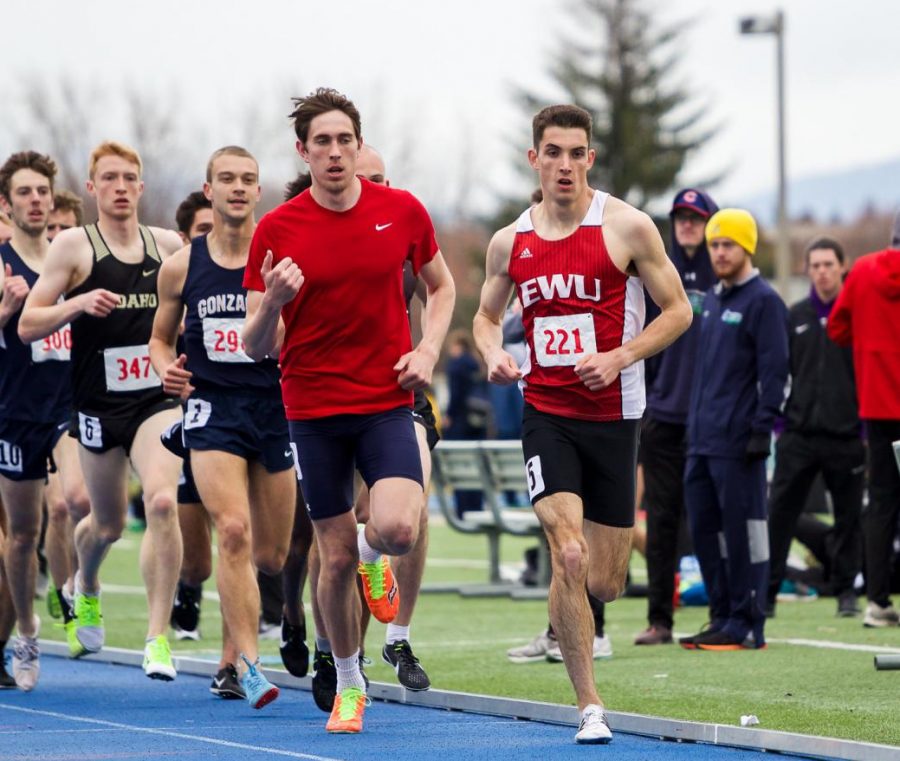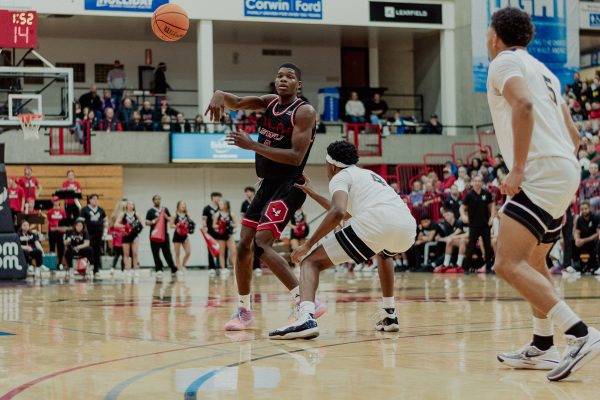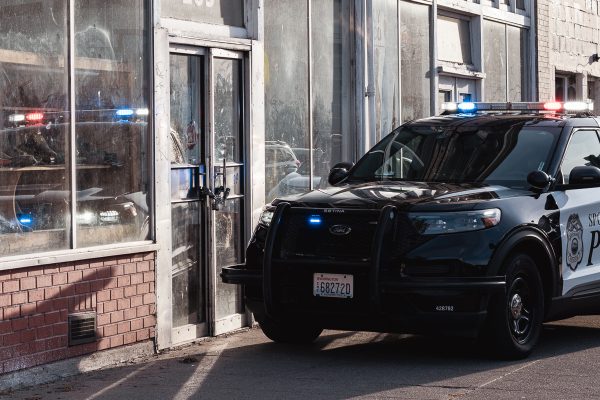EWU’s Barville battles injuries, but is in for the long haul
Sophomore distance runner Issac Barville leads the pack in the 1,500-meter run at the WAR XII on April 6. Barville finished the race first overall with a time of 3:50.62.
April 7, 2019
Making strides
Isaac Barville has dealt with a plethora of injuries in his career as a distance runner, but you wouldn’t know it watching his recent performances. The redshirt sophomore won the 1,500-meter run two weekends in a row and is climbing both the EWU and national leaderboards.
Barville, a University High School alum, runs cross country and track for EWU. As a distance runner, he competes in the 800-meter, 1,500 and 5,000-meter runs during the outdoor track season.
The 1,500 is Barville’s strongest event. His time of 3:50.62 minutes at the WAR XII on April 7 was a personal record. The weekend prior, Barville won the 800 and 1,500 at the Al Manuel Northwest Challenge in Missoula, Montana. He holds the fastest Big Sky Conference time in both events, with his fastest, a 1:54.48 minute mark in the 800. EWU cross country and distance coach Sam Read said Barville has brought a lot of passion to the team.
“He wants to race the best,” Read told The Easterner. “He’s out there working really hard. The fire that he’s bringing is really catching on and other people are working hard with him.”
The starting blocks
Barville started running in middle school. By his junior year of high school he was getting recruited by colleges, as he lettered eight times and was named a team captain. He chose to start his collegiate career at Montana State.
“I was talking with Idaho and Boise State,” Barville told The Easterner. “Boise State was a little bit of a stronger program, so I ended up only being able to communicate with their graduate assistant coach instead of their head coach … Idaho was a little spotty on their communication, so I had a better relationship back and forth with the head coach at Montana State.”
Barville ran for one semester at MSU before realizing that the school wasn’t a fit for him, so he moved back to Spokane to be with his parents and decided to transfer to EWU. There were many logistical reasons Barville cited for his move to Cheney, including academics and his relationship with former cross country coach Chris Shane, who was terminated without cause by EWU on Dec. 19, 2017.
“The coach at the time was really positive, he was a pretty strong encouragement for me,” Barville said. “I also had Running Start credits here, so it made it so I could graduate quite a bit sooner. With the cost of it being cheaper than Gonzaga or Whitworth … It was probably the best fit for me academically and financially.”
Injuries strike
Barville’s road to success has not come easily, as he’s dealt with several injuries throughout his career.
“My first injury was at Montana State,” Barville said. “Before I could compete, I had a heart murmur from one of my ventricles being enlarged. They had to take through a process that was about a month or two before I could run with the team, so I had to run on my own because I wasn’t cleared to practice.”
After his heart murmur healed, Barville had his IT band, which is a tendon that runs down the length of the outer thigh, begin to give him problems that he dealt with for the rest of the season at Montana State. The injuries didn’t stop there, and followed him to Cheney, even persisting through his redshirt year that is required by NCAA transfer rules.
“I got back spasms pretty early on, and that would limit me to about half mileage that I would usually do,” Barville said. “When that finally cleared up, I’d stay healthy for the most part until the year I was eligible. Then, I had tendinitis in my hip flexor. That limited me to about half mileage. I couldn’t race a full load that indoor season.”
The injuries cleared up for last year’s outdoor season, but returned for the indoor season this year.
“In cross country I had tendinitis in my Achilles,” Barville said. “That one lasted … Pretty much the duration of the season. I was probably on a quarter to a third of the mileage that I’d usually be at. I had to supplement it by training in the pool two, three, four times a week. I’d spend hours in the pool.”
Barville said his mentality during his various injury recoveries has been to take it one day at a time.
“You gotta think about what you can do today to be better tomorrow,” Barville said. “When you’re swimming on your own or biking … And you can’t be with your teammates, you have to find that motivation within yourself. Whenever I’d be training on my own I’d be thinking, ‘I’ve put in a lot of work over the summer. I’ve done all this work in the past’. I was hoping on the other end that I’d be able to have the performances that I’d trained so hard to get to.”
Looking forward
Now that Barville is healthy, he’s starting to put up those performances. EWU head coach Stan Kerr sees all kinds of potential in Barville, including the chance for a competition much bigger than anything the BSC has to offer.
“When he’s in his late 20s, he’s probably going to have to move up to the 5,000,” Kerr told The Easterner. “He’s got the heart and the dedication to do that … A good goal for him would be in 2020, try and get into the Olympic Trials. If he makes it to Tokyo, he’ll have a big fan club here.”






![Simmons said the biggest reasons for her success this year were “God, hard work, and trusting [her] coach and what she has planned.”](https://theeasterner.org/wp-content/uploads/2024/05/image1-1-1200x800.jpg)


![Simmons said the biggest reasons for her success this year were “God, hard work, and trusting [her] coach and what she has planned.”](https://theeasterner.org/wp-content/uploads/2024/05/image1-1-600x400.jpg)






